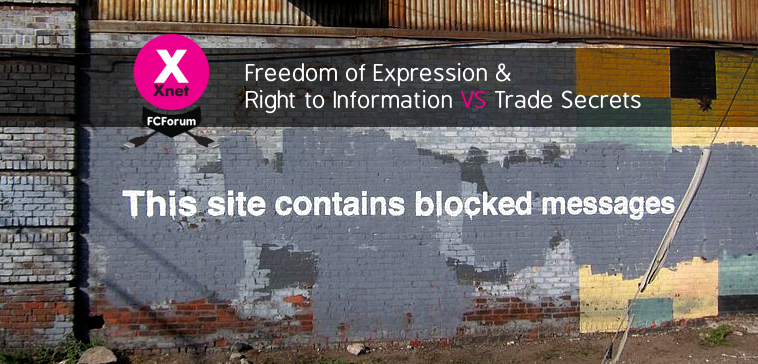Right to Information over Trade Secrets
The right to freely use and disseminate information should be the rule, and trade secrets the exception. Yet, corporate lobbies are currently pushing for a new legal doctrine to make it the other way around.
# European directive on Trade Secrets
In November 2013, a directive was introduced by the European commission, which had been drafted with the help of corporate lobbyists and lawyers (none of these representing SMEs) on a quasi-daily basis.
Corporate lobbies are using the “crisis” as a justification to prioritize commercial interests over civil rights and public interest, as shown by Corporate Europe Observatory [1], to influence the negotiations pushing for a broader trade secrets definition and protection framework, copy-pasted the US-based approach on intellectual property.
A coalition formed by multi-sectoral civil society organisations strongly opposes the rush of the European Commission and Council [2]; for this directive as it threatens consumers’ rights, public health, food safety, environment, freedom of expression, and workers’ rights. Important issues of concern:
- An unreasonably broad and vague definition of “trade secrets” that enables companies to qualify as “trade secret” almost any information they want to keep secret;
- Far-reaching legal solutions for companies whose “trade secrets” have been “unlawfully acquired, used or disclosed”, including provisional and precautionary measures, damage and secrecy rights throughout the judicial process; and
- Increased protection of trade secrets have a chilling effect on whistleblowers and investigative journalism and can be a threat to them.
The directive has been negotiated behind closed-doors discussions know as “Trialogues” between the Commission, the European Parliament and the Council of the EU [3].
Even though the Council of the European Union have been reluctant to accept it [4], the push from the European Parliament to increase the protection for whistleblowers, and to include exceptions in the scope of the directive in order to protect public interests has been reflected in the compromise text resulting from the trialogues, improved in this sense [5]. Yet, further
We welcome the move from the European Parliament to correct the depreotection fo whistleblowers and hope it will hold and extend this position for the rest of the process. Yet, we believe further issues need to be address to ensure the protection of whistleblowers for the public interest, particularly:
- the scope of what should be considered wrongdoings should be clarified with a non-exhaustive list of examples.
- the good faith test should be replaced with a test that examines the reasonable belief of the individual that there is a wrongdoing, misconduct, etc., even if the alleged wrongdoings are not finally proven.
The indicative date for first plenary reading on 12/04/2016.
# Global push for increased protection of trade secrets
This strong move from corporate lobbies is taking place not only in Europe but in the global arena
In the U.S., Congress is considering a new law on trade secrets; the Defend Trade Secrets Act 2015. This bill seeks to create a new federal private right of action for trade secret disclosure, and extend the definition of “misappropriation” to include “acquisition of a trade secret of another by a person who knows or has reason to know that the trade secret was acquired by improper means” (i.e. including acquisition by a journalist from a source).
On 2013, after the revelations of Wikileaks and increased reliance on Whistleblowing platforms and activism against secrecy, harsh guidelines against the revelation of trade secrets were passed in the US, with a heavy focus against “hacktivism” with the goal of facilitating its criminalisation.
Meanwhile, these rules are being mirrored in the several trade agreements promoted by corporate lobbies. The Trans-Pacific Partnership, which contains a mash-up of trade secrets and electronic espionage laws, creating a new offense of unauthorised, willful access to a trade secret held in a computer system, regardless of whether the trade secret is copied or disclosed [6].
Trade Secret is also an issue on the table in the context of TTIP. Since there is no harmonized regulation on Trade Secrets in the European Union until now, the European Commission cannot negotiate this issue in a trade agreement. They need this directive to be adopted so that they have a baseline position. This is why the EU process is now rushed.
Considering the current legislative moves on the two sides of the Atlantic, there is a high chance that harmonisation through TTIP leads to creating protection standards for Trade Secrets based on Intellectual Property Rights, which benefits big business and harms the public interest.
Trade agreements are the most dangerous place to harmonise regulations such as “Trade Secrets” because the negotiation process is both extremely opaque and undemocratic.
Furthermore, the end product of the TTIP negotiation would de facto constitute a permanent law with no possibility to amend it, even if circumstances change or lessons are learned.
ACTIONS AND DEMANDS
The definition of what constitutes a trade secret must be limited. Safeguards and exceptions must be strengthened to ensure that data in the public interest cannot be protected as trade secrets, and that protection of trade secrets is not used by corporations to avoid disclosure obligations and transparency policies.
Instead of standing on the side of the lobbies, that try to legally shield and hide information about their wrongdoings from public interest; we need the European and international institutions to produce regulation that protect journalists, whistleblowers and citizens who facilitate the disclosure of information for the general interest and for the fight against corruption. Providing the certainty that no legal retaliations will come to them while disclosing, investigating or facilitating information for the common good must be a priority for governments and institutions at every level.
We believe that the right to access information for citizen should trump the corporate strategies to hide information.
# Hate Speech / Freedom of expression
ISPs and “platforms” as Internet police and “Terms of Service” as law
There is ongoing tension around the boundary between freedom of speech and hate speech, pro-terrorist speech, and harassment.
Amongst the biggest free speech challenges of the moment are the laws that seek to make Internet intermediaries liable for (certain) speech coming from their users [7]. This mirrors a trend in several EU Member States, e.g. in Germany [8].
Even more, intermediaries are facing a lot of pressure to delete allegedly illegal content, but also legal content that could be uncomfortable for certain audiences on the basis of their terms of service.
Several flaws in this practices suggest that not only they might be ineffective, but also could undermine citizens’ fundamental rights and freedoms and democracy:
- Instead of developing regulations that face the problem, the European Commission is just relying on the, often uncertain, Terms of Services polices of private companies to deal with the issue [9], leaving in their hands to decide what contents are appropriate and which ones should be prohibited, and giving them the power to act as the Internet police.
It is Internet platforms and their policies and terms of service that must rely and comply with properly elaborated laws and not the other way around. - With this “ban” on the basis of Terms of Service approach, platforms can just remove illegal content, without having to actually accuse the individual posting it for doing anything illegal. This is much easier for the platform but fails to tackle hate speech, since it does not prevent the person uploading the hate speech to post it again the next day, and the day after [10].
This approximation clearly does not solve the problem. A holistic approach is not feasible. Illegal, inappropriate, unauthorised contents must be properly defined and each one needs to be treated individually and appropriately. - The proposals of making online companies take down and ban content, to develop discourse on the Internet and “train” civil society [11]; and the manipulation of online speech as a mechanism for preventing radicalisation and hate speech risks on being counterproductive, contrary to democracy, particularly in states with jurisdictions with weak democratic values [12].
# The fight against access to information monopolies
While it is arguably that intermediaries should be able to retain flexibility to choose what content they do and do not wish to host, this flexibility cannot be granted to private monopolies that currently host global conversations acting as public agoras. Instead, they have to be controlled and regulated to ensure their respect for freedom of expression and diversity.
Facebookistan from Jakob Gottschau.
The perverse effects that private monopolies like Twitter, Facebook or Google are having on the global conversation and the right to information must not framed within the classic debate of freedom of expression but on the new debate of about access to information, encompassing the ongoing transition of our societies from communication control based on expression to one based on attention [13].
In the long term, we must move towards the creation of distributed information and global conversation spaces that can be managed as common goods, with public support and resources if needed, instead of having to rely on private monopolies.
Referencias:
[1] – http://corporateeurope.org/power-lobbies/2015/03/eu-draft-trade-secrets-directive-threat-free-speech-health-environment-and
[2] – https://www.laquadrature.net/en/trade-secrets-we-must-act-to-protect-whistleblowers
[3] – https://edri.org/civil_society_calls_for_reform_of_trialogues_in_letter_to_eu_commission_parliament_and_council/
[4] http://corporateeurope.org/power-lobbies/2015/06/first-key-mep-vote-eu-trade-secrets-directive-improved-language-problem-solved
[5] – http://data.consilium.europa.eu/doc/document/ST-15382-2015-REV-1/en/pdf
[6] – https://www.eff.org/es/node/87769
[7] – https://edri.org/ep-committee-adopts-short-sighted-anti-radicalisation-report/
[8] – https://edri.org/enditorial-racism-in-germany-facebook-should-do-more/
[9] – https://www.accessnow.org/blog/2012/09/14/when-doing-no-evil-becomes-exceptionally-difficult
[10] – https://edri.org/eu-commission-itcompanies-fix-hate-speech/
[11] – https://edri.org/eu-commission-itcompanies-fix-terrorist-use-of-internet/
[12] – https://edri.org/eu-parliaments-radicalisation-draft-report-lost-in-translation/
[13] – https://xnet-x.net/en/freedom-of-expression-vs-access-to-information/
[14] – https://vimeo.com/user5292634
# Free Culture Forum 2015 Outcomes were elaborated in collaboration with:
and Gaelle Krikorian, advisor on Access to knowledge and Intellectual Property.

















